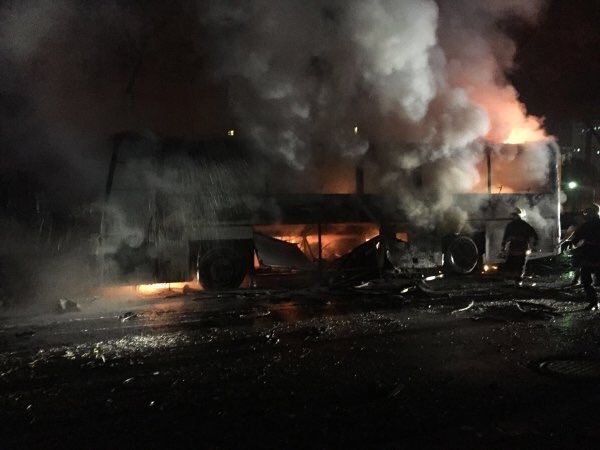Months after the downing of the Russian jet by Turkish Air Force, tensions between Türkiye and Russia show no sign of calming down, instead they are turning into what can be called a proxy war.
Yesterday, a car bombing claimed the lives of 28 Turkish citizens, 27 of which were military personnel and one civilian officer, more than 60 people were wounded. This recent Ankara explosion is different than Suruç bombing and the earlier Ankara bombing, as this attack directly targeted the heart of Turkish military and government.
The Syrian Kurds and their organization, PYD, seems to be the main protagonist, or antagonist, in this matter. PYD has strengthened its position and gained new footholds during every other phase of Syrian civil war, thanks to its flexible alliance and collaboration policy. It cooperated with Syrian rebels against Assad regime, then aligned with PKK and Iraqi Kurds against attacks of Islamic State, eventually receiving support from Russia and improving relations with Assad regime against Syrian rebels and the IS. Even USA sees PYD as the most effective ally against the IS, as Syrian rebels were scattered and their future is now unclear due to Russian intervention. Clever and cunning, PYD is now the most secure group among inter-fighting factions of Pro-Rebel Syria.
It is noteworthy that, after its unlawful annexation of Crimea and infamous intervention in Syria, USA sees Russian supported-PYD as its ally in the region, and not Türkiye, a NATO member and the country which faced the whole burden of the civil war in a neighboring country. PYD’s partner within Turkish borders, HDP, is on good terms with Russia. PYD itself had welcomed the Russian intervention.
As to the recent bombing, Turkish Prime Minister revealed that the bombing was perpetrated by a PYD member, which was quickly denied by Salih Muslim, leader of PYD. Meanwhile, Turkish opposition believes Erdoğan himself played an active role in the bombing, in order to gain an excuse to invade Syria. In order to understand why the sides are accusing each other and denying any responsibility, one must have a closer look to the Kurdish movement.
HDP is a political party in Türkiye, a pro-Kurdish, pro-PKK group, infamous for calling people to riot and kill those who oppose PKK. PKK is so-called Kurdistan Workers’ Party, have killed more than 30.000 people including civilians and Kurdish people themselves. PYD is PKK’s offset in Syria, like PJAK in Iran, all cooperating under umbrella organization KCK, Kurdish Congress.
After yesterday’s bombing, HDP refused to sign the Turkish parliament’s declaration against terrorism. Cemil Bayık, one of the leaders of PKK, claimed that the bombing was an act of retaliation. Abdullah Öcalan, the leader of Kurdish movement serving a life sentence in Türkiye, once said:
“Is it so hard for you to light a match and burn a forest [in tourism regions]?”
“Is it so hard to throw a small bomb in a factory?”
“Is it so hard to burn a fascist’s shop or bureau down one night?”
“Three young Kurds can easily come together and shoot a fascist.”
These words are from an article published in Serxwebun, August 1994, p 17; penned by Abdullah Öcalan, PKK leader.
Therefore, I see something in common with Ukrainians and Turks: they are victims of terrorism, experiencing a proxy war against Russian-backed militia within their borders, left alone by so-called allies against atrocities of a tyrant, and their own governments make such awful mistakes that discontent and qualms at home prevent people from being a united, solid front against Russians and terrorists.
I have no doubt that the bombing was the work of PYD-PKK affiliates, but I have qualms whether Erdoğan’s regime will be able to start a large scale war against both terrorist organizations, PYD and IS, making Russian excuses to intervene null and gaining the support of public opinion.




